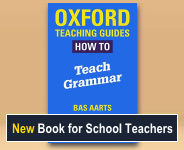Adverbial
Subjects, Direct Objects and Indirect Objects are typically noun phrases (and sometimes clauses) which identify participants in the situation described by the main verb – they answer ‘who’ or ‘what’ questions.
Adverbials are rather different. Consider the highlighted phrases in the examples below:
- And I met this Australian in London. [S1A-050 #6]
- I felt so ill this morning. [S1A-040 #135]
- But Great Britain started off very confidently. [S2A-004 #119]
- We hardly told anybody because it was so dreadful. [S2A-027 #127]
We can look first at meaning. What kinds of meanings do the Adverbials contribute to the clauses? What questions do they answer? See if you can work this out for each example which follows.
| Example | Meaning |
|
Place: ‘Where?’ |
|
Time: ‘When?’ |
|
Manner: ‘How?’ |
We can see that Adverbials typically specify some circumstance of the situation described in the clause – such as where, when, how or why it happens.
What about form? What form does the Adverbial take in each example?
| Example | Form |
|
preposition phrase |
|
noun phrase |
|
adverb phrase |
|
subordinate clause |
Many different types of phrases and clauses can perform the role of Adverbial.
- Preposition phrases and adverb phrases are the most frequent, and subordinate clauses are also quite common.
- Noun phrases are less common, but are quite often used to express time (e.g. last night, the other day).
Here are some further examples which show that Adverbials can express various other kinds of meaning as well as time, place, manner and reason.
- But Harold greatly enjoyed his teaching work. [S2A-041 #16]
- I am also probably going to do a vegetarian dish. [S1A-081 #328]
- If it’s a really nice day we could walk. [S1A-006 #301]
- Although these criticisms are serious they do not discredit the fundamental goals of the medical model. [W1A-007 #99]
In the examples we’ve seen, Adverbials occur in various different positions in the clause. Some Adverbials are quite flexible about their position. An adverbial that is placed at the start of a sentence is called a fronted Adverbial.
Notice how the Adverbials in the examples below can be moved to other positions:
| Example | Alternative |
|
~After a term, I left. |
|
~We could walk if it’s a really nice day. |
|
~I am also going to do a vegetarian dish, probably. ~Probably, I am also going to do a vegetarian dish. |
More than one Adverbial can occur in a clause. Can you identify all the Adverbials in the examples below?
- He penalised Australia very very heavily at Wembley. [S2A-004 #25]
- He penalised Australia [very very heavily] [at Wembley].
- This weekend we’re going to Leeds. [S1A-098 #115]
- [This weekend] we’re going [to Leeds].
- When the dinosaurs dominated the Earth there may only have been ice on high mountains. [W2B-025 #41]
- [When the dinosaurs dominated the Earth] there may [only] have been ice [on high mountains].
Adverbials specify additional information about a situation, and the sentence is still grammatically complete if they are left out:
- And I met this Australian in London. [S1A-050 #6]
- And I met this Australian.
- I felt so ill this morning. [S1A-040 #135]
- I felt so ill.
Key points
Adverbials:
- typically specify the circumstances of a situation (when, where, how, etc.)
- can have various forms (preposition phrase, adverb phrase, subordinate clause, noun phrase)
- can be found in various positions in the clause: they are mobile
- can occur multiple times in the same clause
- can be omitted
Welcome!

Englicious is totally free for everyone to use!
But in exchange, we ask that you register for an account on our site.
If you’ve already registered, you can log in straight away.
Since this is your first visit today, you can see this page by clicking the button below.
- Printer-friendly version
- Log in to view or leave comments

